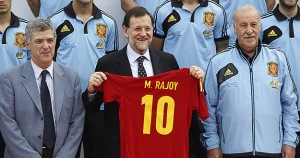
There had been gloomy predictions that Spain’s global soccer ascendancy might be coming to an end, but Tuesday evening’s victory over France was solid if not stellar. Coach Vicente Del Bosque, in characteristically imperturbable fashion, said the win “helps support the conviction we have in our ideas.”
Prime Minister Mariano Rajoy would no doubt love to bask in the same warm glow of vindication, but this week’s economic data suggest he has as much chance of doing that as Scotland have of going to Rio de Janeiro next summer.
Perhaps the most surprising (and dispiriting) thing about the latest batch of figures is that they are no longer very surprising. There was more resignation than outrage on Tuesday when the Bank of Spain predicted that the recession will extend into 2014, with no improvement expected in employment figures even towards the end of this year.
If Mr Rajoy were managing Chelsea he would have been sacked by now. In fact, if he were managing Arsenal he would also have been sacked by now, which says even more.
But economies take longer to rebuild than football teams, and – significantly – this week’s Bank of Spain report called for “more determined action in the broader area of structural reforms.”
Not a call for a change of policy – but for current policy to be implemented with more scope and confidence.
If spending cuts have exacerbated the recession, it can also be argued that recovery has been hampered by not cutting bureaucracy enough. Red tape is still strangling start-up companies, which is undoubtedly part of the problem behind this week’s unsurprising economic projections.
Cash and culture
A high-profile casualty of lean times has been the City of Culture which was being built on a hilltop above Santiago de Compostela until the Galician parliament voted on Tuesday to end further construction. Two facilities planned for the complex – an international arts centre and a theatre – will not now be added to the four existing buildings.
The City of Culture has been viewed by many as little more than an extravagant vanity project of the late Galician leader Manuel Fraga. Regularly allotted the eye-catching adjective “pharaonic”, it has taken longer, cost more and earned less than it was supposed to. Not, then, a model of productive public spending.
But it really did seem like a good idea at the time.
Historically, the road to Santiago has attracted multitudes seeking food for the soul; it was not unreasonable to hope that an imaginative arts project might encourage more of this welcome and uplifting traffic, in the process securing investment and jobs.
Simba’s secret
The potential of the arts sector to create employment and generate wealth is an idea vigorously promoted by Spain’s National Federation of Theatre and Dance Companies (FAETEDA). Making the case that lower taxes in the sector would actually enhance public revenue, FAETEDA says that in the six months since VAT on theatre tickets was raised from eight to 21 percent, the number of theatre-goers has plummeted by as much as a third.
If the original VAT rate had been kept, the organisation argues, tax income would have been higher and the theatre industry could have created more jobs instead of laying people off.
But it should probably be noted that during the same period (and for a long time before that) The Lion King, to take just one example of kitsch yet hummable musical theatre, has been playing to full houses in Madrid.
This suggests (more or less compellingly) that the challenge of putting bums on seats may have more to do with taste (or the lack of it) than with tax.
Football clubs have similarly bucked the downward economic trend, with Real Madrid and Barcelona remaining firmly on top of the 2012 global rankings in terms of income.
Perhaps soccer managers and low-brow impresarios understand the demands of the market better than government economic planners or, indeed, champions of high art.
To read more by Anna Maria O’Donovan visit My Spanish Interlude.
Reading this interesting article (despite the grossly unkind remarks about ‘the Gunners’!!) it struck me that one could probably describe Vicente Del Bosque as a modern Spanish hero. or possibly icon – successful yet untainted by corruption.
I wonder who else your readers might class as a modern living Spanish hero?
No more heroes?
What a pity!